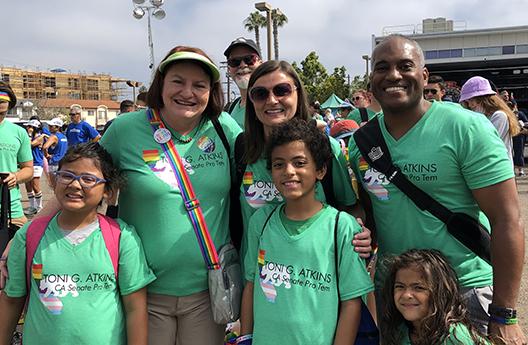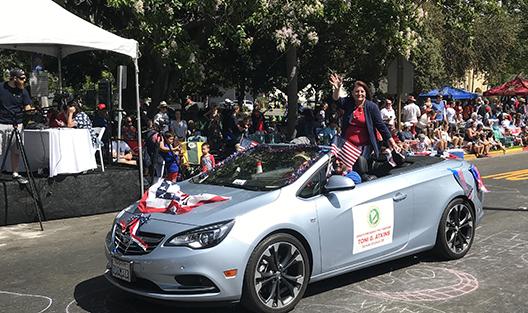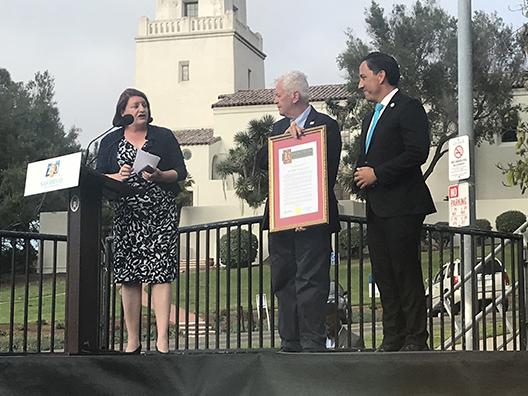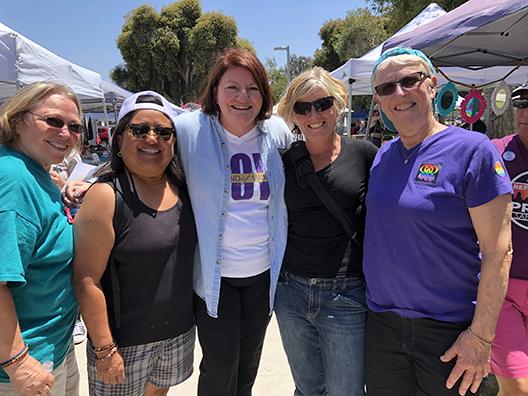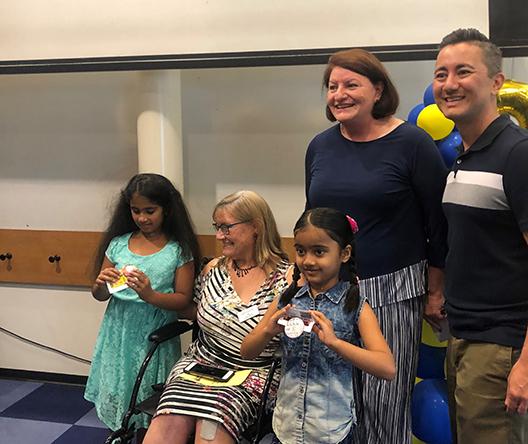August 2019 Newsletter
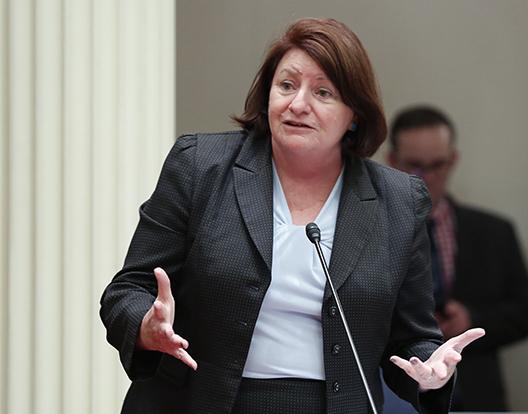 Speaking about AB 1054 on the Senate floor. |
The catastrophic wildfires of 2017 and 2018 were the most deadly and destructive in California history, leading to the deaths of 129 people and the destruction of entire communities. San Diego knows wildfires like these all too well.
As San Diego and all of California enter the hottest months of the year, and peak fire season, Governor Newsom and the Legislature have taken a number of important steps to help prevent those kinds of disasters from happening again.
Climate change is affecting weather patterns and extending the fire season, but there are other factors, as well. For example, the five-year statewide drought parched our chaparral, forests and other wildlands, killing more than 100 million trees and making small, rural communities, and the boundaries of larger cities a kind of dry kindling for horrific blazes.
In some cases, the ignition sources for these fires came from the vast network of electrical lines erected by private utilities – such as Pacific Gas & Electric. In addition to the tragic loss of life, the fires sparked by electrical lines caused billions of dollars in property damages and terrible losses to residents, businesses, and public agencies. These damages affect PG&E, but also Southern California Edison and San Diego Gas and Electric.
Utilities rely on their good credit to borrow and finance costs in order to invest in their infrastructure to prevent future fires, to compensate fire victims and to procure the clean energy that is the backbone of our state’s climate efforts. Without legislative action, the credit rating of the three utilities was in danger of being downgraded significantly, resulting in increased borrowing costs, possible bankruptcy, and, most importantly for the people of California, higher costs on household energy bills.
If we did not act, the economic and environmental costs to the state would be massive. Clearly, this was an unacceptable outcome for my colleagues and me in the Senate.
Working with the Governor and our colleagues in the Assembly, we crafted a measure, AB 1054, that ultimately received strong support from Democrats and Republicans alike.
AB 1054 requires utilities to invest $5 billion immediately to make their infrastructure safer to prevent future fires. It creates a new independent board to oversee fire safety so that utilities put safety first. AB 1054 further requires utilities to obtain extensive safety certifications that are reviewed annually. It also establishes a catastrophic wildfire fund to help pay wildfire victims, with first priority for funding coming from the pockets of utility shareholders, who will pay billions of dollars more into this fund than utility consumers. Only if a safety certification is issued and maintained would a utility be able to participate in a fund to cover the damages from future wildfires.
The Senate fought for a number of additional provisions, including stronger utility safety requirements through field audits and annual review, which, oddly, wasn’t happening. It also took on the corporate culture of utilities by requiring strict new executive compensation requirements, including tying salaries and compensation such as bonuses to safety performance.
As with any big issue affecting our state, no single piece of legislation is perfect. However, AB 1054 is a step forward. There is more work to do. When the Legislature reconvenes on August 12, wildfire preparedness – including insurance issues, additional investments in defensible space and structure protection – will be among our top priorities.
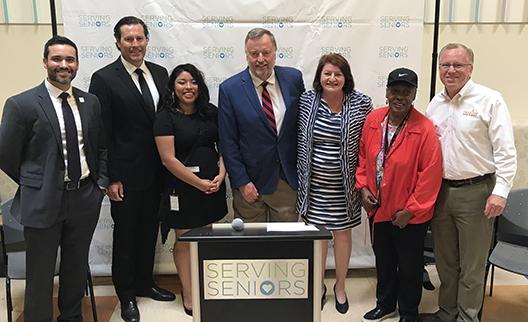 Thank you to Serving Seniors, Feeding San Diego and county Health and Human Services officials for supporting our seniors and residents with disabilities. |
In July, I was beyond happy to join several wonderful community organizations at an event to spread some great news about seniors and people with disabilities getting new access to CalFresh, California’s assistance program for residents struggling with food insecurity.
Last year, the Legislature and the Governor made Californians who receive supplemental security income (SSI) eligible for CalFresh benefits. The policy change became effective on June 1, 2019 – and on July 23, Serving Seniors, Feeding San Diego, and 2-1-1 San Diego held a special event to assist people with their applications and get the word out through the media.
Under the old rules, those who receive SSI weren’t eligible for CalFresh; instead, they received an extra $10 a month as a nutrition benefit. That might have made sense once upon a time, but no longer. Now they’re eligible for assistance that averages $130 per month; at the same time, they won’t see any reduction in their SSI benefit.
This change will have the potential of relieving roughly half a million Californians of the agonizing decision of choosing between food and other essential needs, including more than 32,000 in San Diego County. As of late July, more than 285,000 newly eligible people had filed their CalFresh applications.
But I want more! If someone you know receives SSI, please let them know they might be eligible. They can apply at www.GetCalFresh.org or receive assistance from 2-1-1 San Diego (www.211sandiego.org).
It was another amazing Pride Parade in San Diego as a crowd estimated at more than 300,000 people gathered in celebration and solidarity with our LGBTQ community. This year’s Pride festivities were especially important because 2019 marks 50 years since the Stonewall Uprising in New York City. It was an honor for me to travel to New York to commemorate the occasion in late June, just as it’s an honor for me to participate in San Diego’s parade. Thank you to everyone who walked with our team!
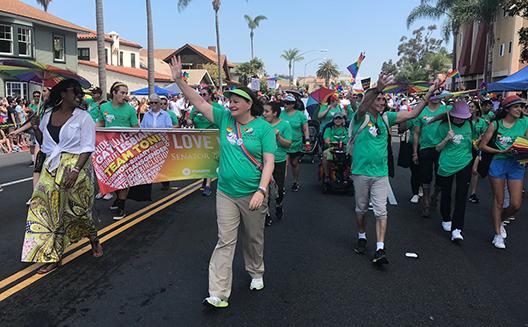 |
 |
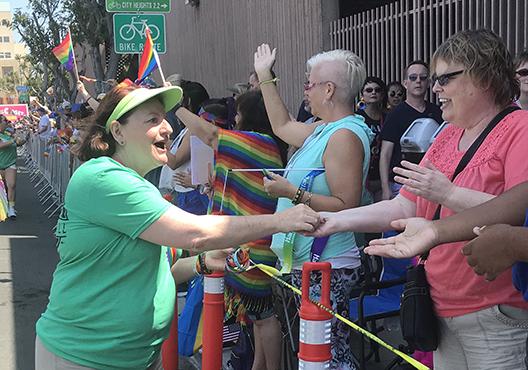 |
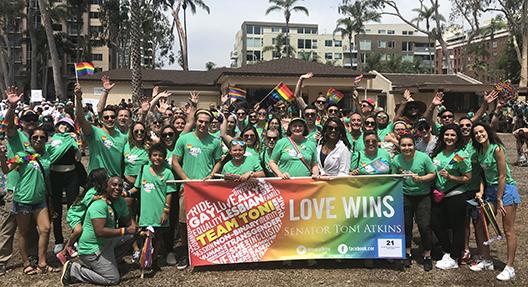 |
|
|
 |
The California Complete Count - Census 2020 Office invites you to a regional convening in San Diego to share information about the state’s 2020 Census outreach campaign and how the state is working with local partners to reach the hardest-to-count populations. The public session that goes from 10 a.m. to noon on Friday, August 16, will provide attendees with the latest information on outreach efforts and how we can engage in our region.
The Census count is vitally important because it provides the basis for how much federal funding our state receives over the next decade, as well as determining the number of seats in California’s congressional delegation. Learn more at www.census.ca.gov.
The August 16 event takes place at the Educational Cultural Complex, 4343 Ocean View Blvd. in San Diego’s Mountain View neighborhood. Free parking is available in a large parking lot at the complex. Please register here.
|
Getting More Women in the Boardroom |
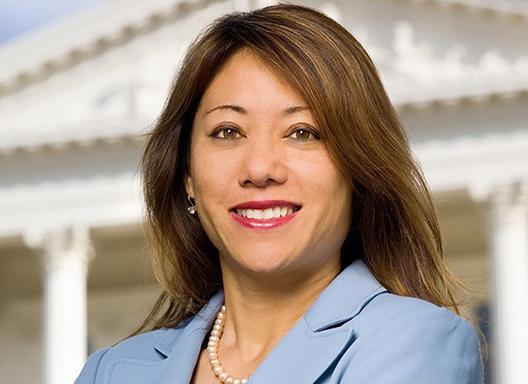 Treasurer Fiona Ma |
In 2018, I partnered with my colleague, Senator Hannah-Beth Jackson, to pass a bill requiring California companies to include women on their boards of directors.
In support of that effort, our state Treasurer, Fiona Ma, has created a registry of women interested in serving on corporate boards. This registry will be shared with companies in order to help them identify candidates and comply with the law.
Treasurer Ma is inviting interested women who are experienced in banking, public finance, accounting, and executive-level decision-making to join the registry by sending their resumes to her office. She intends to match the resumes to boards that correlate with a person’s skill set.
Women who are interested in being included in the registry can contact Xochilt Becerra at the state Treasurer’s Office. Her phone number is 916-653-2995, and her email address is Xochilt.Becerra@treasurer.ca.gov.
This year’s legislative session reconvenes on August 12. My colleagues and I in the Senate and the Assembly will have just over a month to finish our business for the year and send our bills to the Governor for his signature. Here’s a rundown of my legislation this year:
SB 1 – the California Environmental, Public Health, and Workers Defense Act of 2019 – is California’s response to the reckless deregulation happening at the federal level. SB 1 ensures that any federal environmental or worker safety standard in place as of January 19, 2017, remains in effect under state law even if the federal government rolls it back. SB 1 cleared the Assembly Natural Resources and Judiciary committee in July and advanced to the Appropriations Committee.
SB 66 allows clinics and rural healthcare providers to bill Medi-Cal for two visits on the same day if patients receive mental health treatment on the same day they receive other medical treatment. This will help ensure healthcare providers can continue to deliver vital mental health services and be reimbursed for those services. SB 66 cleared the Assembly Health Committee in July and advanced to the Appropriations Committee.
SB 165 is the next step to ensure that limited English proficient Medi-Cal enrollees have qualified in-person language interpreter services when they visit their medical provider. The bill is a follow-up to AB 635, which required a study of the issues surrounding medical interpreters and creates a four-site pilot project. SB 165 cleared the Assembly Health Committee in July and advanced to the Appropriations Committee.
SB 451 creates an economic-development tool by establishing a tax credit for the preservation and rehabilitation of historic buildings in California. To qualify, the property must be on the National Register of Historic Places or the California Register of Historical Resources. The applicable credit will be for 20% of the qualified rehabilitation expenditures, and would offer a 5% bonus on top of that if certain criteria are met. California is one of 15 states that do not have a state-level historic preservation tax credit. SB 165 cleared the Assembly Revenue and Taxation Committee in July and advanced to the Appropriations Committee.
SB 507 transfers the remaining submerged areas within San Diego Bay controlled by the State Lands Commission to the Port of San Diego. The bay’s waters would be better managed by the same local agency that oversees the land around the bay – the Port of San Diego. SB 507 is common-sense and overdue legislation that will improve environmental, economic and safety conditions in San Diego Bay and eliminate duplicative efforts while maintaining the protection of the public tidelands. SB 1 cleared the Assembly Natural Resources Committee in July and advanced to the Appropriations Committee.
I will continue to provide updates on all of my bills as they work their way through the legislative process. Please feel free to contact my terrific, hard-working district staff for the latest information from the Capitol: 619-645-3133.
|
Social Media Corner |
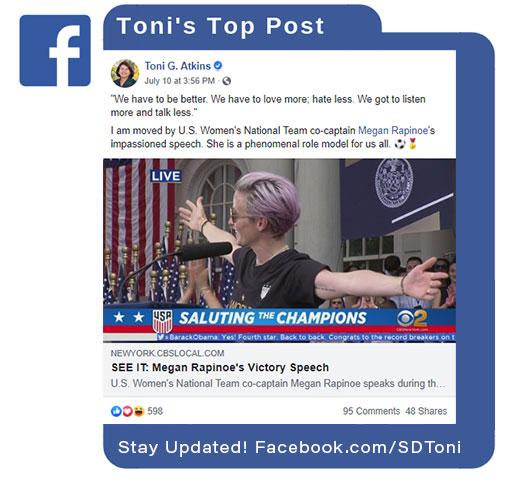 |
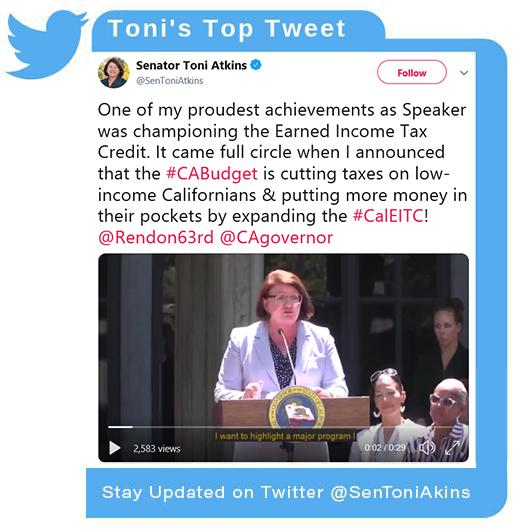 |
My district staff is always available to help constituents navigate a complex web of state agencies. If you’re having trouble working out an issue with any state agency, please call my office at 619-645-3133, and my staff will do everything in their power to help.
|
My District Staff |
Where to Find Me Online
|
My district office is located at 1350 Front St., Room 4061, San Diego, CA 92101.
|
|
|
|
|
|
|
|
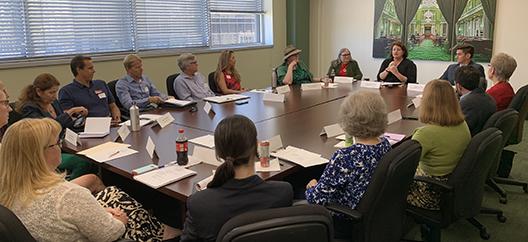 It was an informative afternoon as I caught up with San Diego’s environmental leaders, learned about their current projects and discussed what’s happening in the Capitol. |
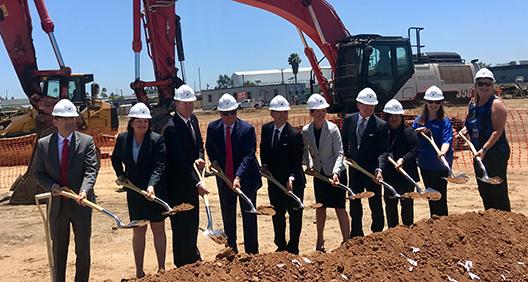 I was excited to stand with Cubic as the company breaks ground on a new global headquarters! With the help of the California Competes Tax Credit program, Cubic will create 300 new jobs in San Diego and make an investment of $113 million. I love a home-grown success story. |

